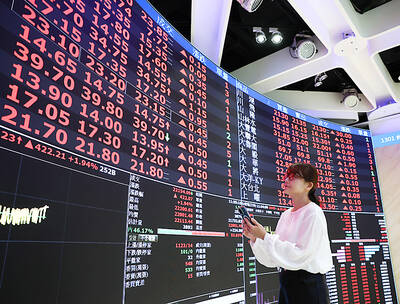Compal Electronics Inc (
The company made the remark after a Chinese-language media reported yesterday that Arcadyan Technology Corp (
"The listing of Arcadyan Technology will be in Taiwan," Compal spokesman Gary Lu (呂清雄) said during a telephone interview yesterday.
It was still too early to talk about the details of the listing, as the board had not given the green light, he said.
Share swap
The Commercial Times reported yesterday that Compal was mulling an initial public offering (IPO) for Arcadyan in Hong Kong, through a share swap with a foreign holding company within the Compal group.
The paper added that this would be the first overseas IPO for a subsidiary of the group.
Arcadyan will likely increase its capital to as much as NT$900 million (US$27 million), from the current NT$700 million, through open subscription before the second quarter, the paper said, adding that the company would release 25 percent to 30 percent of its stock for an IPO debut in Hong Kong in the second half.
Arcadyan had originally planned for a listing on the Emerging Stock Market (興櫃市場) in the second quarter and to list on the main bourse next year, but this had been pushed forward to enable it to adapt to the expanding Chinese market, the Commercial Times reported.
Arcadyan posted sales of NT$7.5 billion last year, up from NT$5 billion in 2005, Lu said.
Compal stocks closed down 1 percent yesterday at NT$29.65 on the Taiwan Stock Exchange.
A number of local businesses have chosen to launch IPOs in Hong Kong to bypass the government's investment rules on China -- the nation's largest investment destination.
The Hong Kong's Hang Seng Index rose approximately 34 percent last year, while the TAIEX gained about 19 percent.
Takeover
Compal announced last August it would buy Arcadyan for NT$984 million.
Compal bought 26.6 million shares at NT$37 per share for a 69 percent stake in Arcadyan, which was previously fully owned by Accton Technology Corp (智邦科技).
The share purchase and Arcadyan's Internet protocol technology gave Compal the capability to create a complete wireless communications business in areas of digital multimedia home applications and dual-mode phones.

UNCERTAINTIES: Exports surged 34.1% and private investment grew 7.03% to outpace expectations in the first half, although US tariffs could stall momentum The Chung-Hua Institution for Economic Research (CIER, 中華經濟研究院) yesterday raised its GDP growth forecast to 3.05 percent this year on a robust first-half performance, but warned that US tariff threats and external uncertainty could stall momentum in the second half of the year. “The first half proved exceptionally strong, allowing room for optimism,” CIER president Lien Hsien-ming (連賢明) said. “But the growth momentum may slow moving forward due to US tariffs.” The tariff threat poses definite downside risks, although the scale of the impact remains unclear given the unpredictability of US President Donald Trump’s policies, Lien said. Despite the headwinds, Taiwan is likely

READY TO BUY: Shortly after Nvidia announced the approval, Chinese firms scrambled to order the H20 GPUs, which the company must send to the US government for approval Nvidia Corp chief executive officer Jensen Huang (黃仁勳) late on Monday said the technology giant has won approval from US President Donald Trump’s administration to sell its advanced H20 graphics processing units (GPUs) used to develop artificial intelligence (AI) to China. The news came in a company blog post late on Monday and Huang also spoke about the coup on China’s state-run China Global Television Network in remarks shown on X. “The US government has assured Nvidia that licenses will be granted, and Nvidia hopes to start deliveries soon,” the post said. “Today, I’m announcing that the US government has approved for us

When Lika Megreladze was a child, life in her native western Georgian region of Guria revolved around tea. Her mother worked for decades as a scientist at the Soviet Union’s Institute of Tea and Subtropical Crops in the village of Anaseuli, Georgia, perfecting cultivation methods for a Georgian tea industry that supplied the bulk of the vast communist state’s brews. “When I was a child, this was only my mum’s workplace. Only later I realized that it was something big,” she said. Now, the institute lies abandoned. Yellowed papers are strewn around its decaying corridors, and a statue of Soviet founder Vladimir Lenin

The National Stabilization Fund (NSF, 國安基金) is to continue supporting local shares, as uncertainties in international politics and the economy could affect Taiwanese industries’ global deployment and corporate profits, as well as affect stock movement and investor confidence, the Ministry of Finance said in a statement yesterday. The NT$500 billion (US$17.1 billion) fund would remain active in the stock market as the US’ tariff measures have not yet been fully finalized, which would drive international capital flows and global supply chain restructuring, the ministry said after the a meeting of the fund’s steering committee. Along with ongoing geopolitical risks and an unfavorable